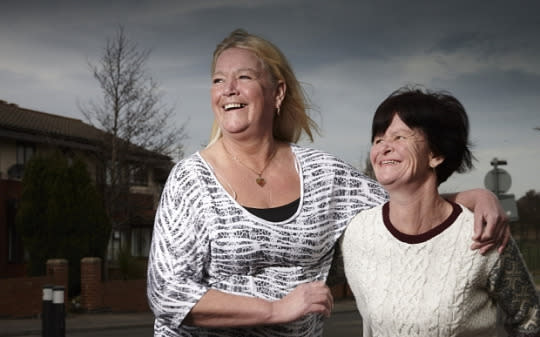Benefits Street is shameless poverty porn. The real villains live on Bankers Boulevard and Tax Dodgers Avenue

The production company behind Benefits Street – owned by one R Murdoch, of 152 Tax Havens – have tried hard to make the new series more sympathetic than the last.
They gave the greatest prominence to Julie Young, 53, pictured left, who was painted as the matriarch of Kingston Road, in Stockton-on-Tees’s deprived Tilery estate.
Not only did she care for her severely mentally and physically disabled son Reagan for 15 years before his recent death, she continues to look after five other children and also manages to cook for neighbour Lee after his electricity supply was cut off.
Yet, however many touching tales of hard-scrabble lives Love Productions shoehorn in to avoid criticism, their documentary remains sensationalist poverty porn, an old-fashioned freak show repackaged for the modern era.
Last night social media brimmed with vitriol, with Katie Hopkins, Britain’s senior cheerleader of the foul-minded and empty-headed, gleefully describing a man with (likely self-imposed) memory loss as “thick as s***” and lambasting the residents for everything from their “own fault” unemployment to their ability to make gravy.
The aftermath of this orgy of demonization and derision was certainly the perfect time for the new majority Tory government to announce that the household welfare cap would be lowered from £26,000 to £23,000 – meaning more of my neighbours will be forced to rely on food banks or leave London, a city where most people oppose cruel Tory austerity and where Labour bucked the election trend by increasing its number of seats from 38 to 45 out of 73.
It was also interesting that on the same night – and also trending on Twitter - Channel 4 broadcast Made In Chelsea, whose wealthy “reality” stars, like Princes William and Harry, use words like “mate” and even drive their own cars in a bid to trick us into thinking privately-educated, closed-off members of a wealth-hoarding elite have something in common with us plebs.
Benefits Street is every bit as distorted a reality – except that it serves to foster division and entrench the feeling that those on benefits are nothing like the rest of us.
The producers of such shows travel to find the most extreme examples of individuals and do nothing to challenge misconceptions about welfare.
Polls show Britons erroneously think that 41% of the social security bill is spent on the unemployed, whereas the correct figure is only 3%.
Pensioners receive the bulk of the government handouts – 15-times more than recipients of Jobseekers’ Allowance get.
In fact, most people on welfare earn their poverty – with tax credits and a soaring housing benefit bill supplementing the dismal wages paid them.
Yet distorted media portrayals like Channel 4’s ensure that the poorest people in Britain all too often turn on their neighbours rather than the real villains in our society, who are doing very nicely indeed out of austerity.
Instead of Benefits Street, I’d like to see broadcasters make programmes like Bankers Boulevard or Tax Dodgers Avenue.
They could show how the very people who caused the economic crisis for which the poorest are now paying have received £100billion in bonuses since the crash – only £33billion less than the sum taxpayers spent bailing out the banks.
Such documentaries could highlight how 3,250 government officials investigate benefit fraud worth £1.2bn while just 300 probe tax-dodgers that cost Britain anywhere between £34billion and £119billion, depending on estimates.
We can expect the Tory government to apologise for their greedy, rich cronies while hammering the rest of us. But we shouldn’t expect a public service broadcaster like Channel 4 to help them do their job.

 Yahoo News
Yahoo News 
